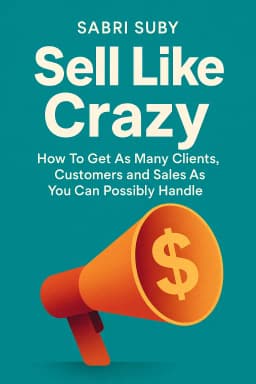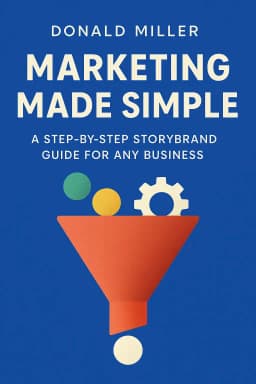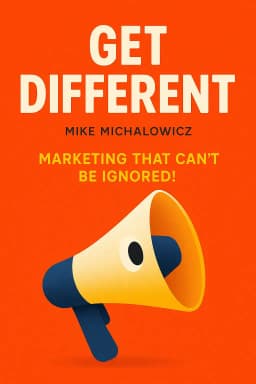
The Heretic's Guide to Growth
Eight Lessons to Secure Infinite Growth
Golden Hook & Introduction
SECTION
Olivia: Most businesses are obsessed with growth. But what if the secret to explosive, 'infinite' growth isn't about getting more customers, but about intentionally ignoring 98% of them? Jackson: That sounds like a recipe for bankruptcy. It’s like a band deciding to only play for the front row and hoping the sound carries. But you’re saying today we’re exploring why that might actually be genius. Olivia: We are. This radical idea is the heart of Rocket: Eight Lessons to Secure Infinite Growth, written by a team of senior partners at The Boston Consulting Group, including Michael J. Silverstein. Jackson: Right, so this isn't just a blogger's hot take. This comes from BCG, one of the world's top strategy consulting firms. They're the ones advising Fortune 500 companies on how to grow. And yet, the book has a bit of a mixed reception online—some people love the stories, others find that 'infinite growth' promise a little... ambitious. Olivia: Exactly! And that tension is what makes it so interesting. They argue that to build something immortal, you have to start by focusing on a very, very small group of people they call 'apostles.'
The Cult of the Apostle
SECTION
Jackson: Okay, 'apostles.' That's a strong word. It sounds more like religion than retail. What makes someone an apostle instead of just a loyal customer? Olivia: It’s about their impact. The book lays out this mind-bending concept they call the 2/20/80 rule. It states that for these iconic brands, just 2 percent of their consumers directly contribute 20 percent of sales. Jackson: Hold on. Two percent of customers account for a fifth of all sales. That alone is pretty wild. Olivia: It gets wilder. That same 2 percent, through their recommendations and word-of-mouth advocacy, drive 80 percent of the total volume. They are your marketing department, your sales force, and your most profitable segment, all rolled into one. The authors even quantify it with an eight-to-one ratio: one apostle generates eight times their own consumption through what they tell their friends and family. Jackson: That math feels… magical. How does that actually work in the real world? It sounds like you’d have to be selling something truly life-changing. Olivia: Well, let's look at The Container Store. When they started, people were skeptical. A store that just sells empty boxes? But the founders, Kip Tindell and Garrett Boone, didn't market to everyone. They focused on the top-tier social elite in Dallas. Jackson: Ah, so isn't this just a fancy way of saying 'focus on rich people'? That seems to be the easiest path. Olivia: That’s the tempting conclusion, but the book argues it's about passion, not just wealth. The Container Store’s early apostles weren't just wealthy; they were people obsessed with organization as a solution to a chaotic life. They saw the store not as a place for boxes, but as a place that sold control, peace, and order. They were the ones who would host a dinner party and, when someone complimented their home, would spend the next ten minutes evangelizing about a specific closet system. They spread the gospel. Jackson: So the apostle is the person who doesn't just like the product, they believe in the problem it solves so deeply that they need to convert others. Olivia: Precisely. The book shares the story of a woman named Jenny, a 27-year-old professional in Brooklyn. She's a Victoria's Secret apostle. She's not a millionaire, but she has an inventory of 30 sets of their underwear for every conceivable occasion—work, weekends, exercise. She feels the brand gives her confidence and sexiness, and she actively tells her friends that they need to shop there. She is the 2 percent. She’s not just buying a product; she’s buying an identity, and she wants her friends to share in it. Jackson: I see. It's less about the price tag and more about the psychological ownership. They feel like the brand is theirs. Olivia: Exactly. And once you have these apostles, the book says your job gets even stranger. You have to find them, woo them, and then… you have to be brave enough to ignore what they say they want.
The Heretic's Playbook
SECTION
Jackson: Okay, that’s the part that sounds like a trap. You find your biggest fans, the people keeping your business alive, and then you ignore them? That feels like the next level of business insanity. Olivia: It does, but it’s the first and most provocative rule in the book: "Don’t Ask Your Customers What They Want (Because They Don’t Know Until You Show Them)." The authors argue that customers can only think within their existing frame of reference. They can ask for a faster horse, but they can't invent the car. Jackson: That’s the classic Henry Ford quote, which he probably never said, but the point stands. You’re talking about visionary leadership. Olivia: Exactly. The book's hero for this chapter is Les Wexner, the founder of L Brands, which includes Victoria's Secret and Bath & Body Works. In the 1960s, he noticed that his parents' clothing store made all its profit on women's sportswear, but his dad dismissed it. So Wexner borrowed $10,000 and opened a store that only sold sportswear. He didn't use a focus group; he used his own curiosity and observation. He created a category. Jackson: And he did it again with Victoria's Secret, right? He took this niche, slightly seedy concept of lingerie and made it mainstream, aspirational. Olivia: He did. He saw an opportunity to make 'sexy' accessible and glamorous, not something hidden away. But the most powerful story is the flip side of this. The book tells the story of a communications giant in the early days of mobile tech. They held focus groups for a prototype cell phone, showing this clunky box to salespeople. Jackson: Let me guess. The salespeople hated it. Olivia: They laughed at it. They said, "Why would I carry this brick around and pay a fortune when I can just use a payphone?" Based on that feedback—on what their customers said they wanted—the company put cell phone technology on the back burner. They listened their way into losing billions and missing the future. Jackson: Wow. That is a brutal lesson. But come on, 'don't listen to your customers' sounds like a recipe for disaster for 99% of businesses. There's a huge risk of just building something nobody wants because of your own ego. Olivia: You're right, and the book offers a more nuanced tool to avoid that. It's not about ignoring customers, but about a deeper form of listening. They call it understanding "demand spaces." Jackson: Okay, that sounds like consultant-speak. What is a 'demand space' in plain English? Olivia: Think about snacks. Frito-Lay was facing slowing growth. They realized they weren't just competing with other chips; they were competing with everything you might eat when you're hungry. A demand space isn't a product category, like 'salty snacks.' It's an occasion, an emotional need. For example, one demand space is 'Fun Times Together'—like watching a game with friends. Tostitos and dip own that space. Another is 'Young & Hungry'—a teenage boy coming home from school who needs immediate, satisfying food. That’s where they created Doritos Loaded, a heated, cheese-filled snack. They didn't ask customers, "Do you want a hot Dorito?" They understood the demand space and created a product to fill it. It’s about anticipating the need behind the occasion. Jackson: That makes so much more sense. It’s not ignoring people; it’s observing their lives so closely that you understand their needs better than they can articulate them. It’s a different kind of listening. Olivia: It's a deeper kind. But even when you get all of this right—you find your apostles, you innovate brilliantly—the book warns that the entire system is incredibly fragile. And it uses a fascinating, and frankly terrifying, idea from anthropology to explain why.
Schismogenesis: The Unstable Heart of Brand Loyalty
SECTION
Jackson: I’m ready. Hit me with the obscure academic term. Olivia: The term is schismogenesis. It was coined by the anthropologist Gregory Bateson, and it describes how relationships are never static. They are always in a state of change, either cycling up or cycling down. Jackson: Schismo-what? Break that down for me, Olivia. Olivia: Schismogenesis. It means 'creation of a split.' Bateson said relationships escalate in one of two ways. There’s symmetrical schismogenesis, where two parties mirror each other's actions, like an arms race. Each nation builds more missiles, so the other builds more, and it spirals up. Then there's complementary schismogenesis, where the actions are opposite but interlocking, like a dominant person becoming more assertive and a submissive person becoming more passive. Eventually, the relationship breaks. The core idea is that relationships are never, ever stable. They are always in motion. Jackson: Wow. So you're saying a brand's relationship with its customers is like a marriage? It's either getting better or it's getting worse, it's never just 'fine'? Olivia: That's exactly what the book argues. A brand is an emotional connection, and it's subject to these same forces. An event can trigger a rapid upward or downward spiral. The book points to the Toyota recall crisis from 2009-2010. They had a massive problem with unintended acceleration. Their reputation for safety, their core brand promise, was shattered. That was a moment of intense downward schismogenesis. Jackson: I remember that. It was everywhere. It felt like they might not recover. Olivia: But they did. They took responsibility, the CEO publicly apologized, and they obsessively re-engineered the solution. They actively managed the downward spiral and began the long, slow process of cycling back up. They treated the customer scorn as a gift, a chance to prove their commitment. In contrast, the book mentions the NFL's ongoing crisis with player safety and concussions. For years, the response was denial and slow, incremental changes. That created a long, slow, downward complementary cycle where the league's authority was questioned more and more, and trust eroded. Jackson: So schismogenesis explains why a swift, painful crisis can sometimes be easier to recover from than a slow, simmering problem that a brand refuses to fully address. Olivia: Precisely. It highlights the incredible fragility of brand love. You can spend decades building a legion of apostles, but one misstep, one moment of arrogance, can trigger a cycle that tears it all down. Jackson: So what's the practical takeaway from this? Are brands supposed to be in constant couples therapy with their customers? Olivia: In a way, yes. The book says you must have a formal process for appraisal by your best customers. You need to constantly nurture the relationship, welcome the scorn, and understand that loyalty is something you have to re-win every single day. You can never take it for granted, because the relationship is never standing still.
Synthesis & Takeaways
SECTION
Jackson: So it seems the path to being an 'apostle brand' is this wild mix of math, madness, and anthropology. You have to be obsessed with a tiny group of fans, brave enough to ignore their surface-level requests to serve their deeper needs, and paranoid enough to know that their love can vanish in an instant. Olivia: Exactly. And the book's challenge to every listener is to stop asking 'How can I get more customers?' and start asking a different, more powerful question: 'Who are my 2 percent? And what giant leap can I take that they don't even know they're waiting for?' It’s about finding your apostles and building your church. Jackson: I love that framing. It’s a total shift in perspective. We're so curious to hear what brands you all feel like an 'apostle' for. What company do you evangelize to your friends? Let us know on our socials, we'd love to hear your stories. Olivia: It’s a great question to reflect on. What brand has earned that level of your trust and passion? Jackson: This is Aibrary, signing off.









